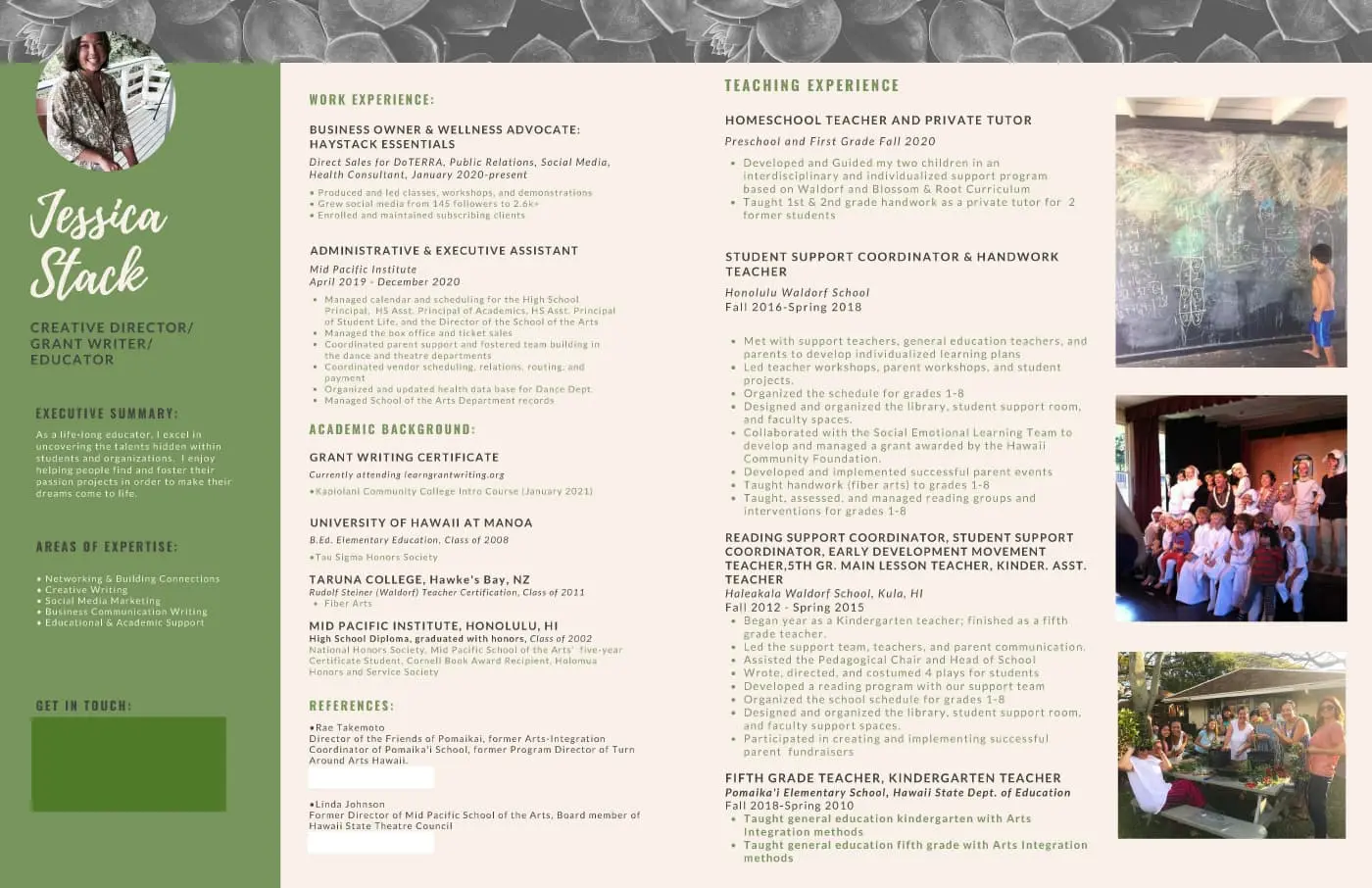Teachers work harder now than ever before.
A 2023 study found that teachers work an estimated 53 hours a week, almost a full workday longer than the average working adult in the US. A whopping 25% of their work also goes uncompensated. Back in 2020, nearly 17% of teachers worked second jobs during the school year to supplement their incomes.
With today’s wild economy and increasing pressures on teachers—financial, societal, and emotional—these numbers are even higher today. It’s tough out there!
Do the pains of working uncompensated overtime hours or supplementing your teacher salary sting for you too?
👉 If you’re a teacher and you feel like the system is failing you, you are not alone. You want to do what’s best for you, your family, and your career, and that might mean leaving the teaching profession. Teachers make the transition to new careers and lines of work for all kinds of reasons.
This guide will equip you with the knowledge, ideas, and resources you need to start navigating a career change with confidence. Here’s what we’ll cover:
- The transferable skills of teaching
- Ideal industries for career changes from teaching
- 15 alternative career ideas for teachers
- How to change careers as a teacher
- Real-life career change stories
But first, who are we?
We’re Learn Grant Writing, home of the Global Grant Writers Collective. We provide curriculum, coaching, community, and certification for those ready for a career pivot to become well-paid grant writers.
Our community includes many former teachers (check out the examples below) who have made career changes. They’re earning more and have claimed more freedom, flexibility, and purpose in their lives. On average, it takes our members just 6.6 months to land a new job and 9 months to launch their own side hustles and freelancing careers!
Grant writing might be the right choice for you, too! Check out our members’ success stories or beginners’ guide, “How to Make Money as a Grant Writer,” to learn more.
Understand the Transferable Skills You Bring to the Table
Taking stock of your transferable skills is the first step in considering a new field. Acknowledging what’s in your toolbox allows you to consider a variety of career pivots. Plus, you get to build up that confidence factor by considering how all the hours in the classroom translate to killer skills in other fields. Who doesn’t love that?
⭐ As a teacher, we see you. You’ve honed skills that are assets in all kinds of new fields. Feel proud of that! ⭐
In our work with former teachers in the Global Grant Writers Collective, we often see these standout qualities and skills:
- Intrinsic motivation. You are mission-driven and heart-led in your work. Daniel, a member of the Collective, said that “teaching is not a job you do for the glory; it’s a job you do because you love helping people.” We couldn’t agree more. Money does not prevent burnout. What helps you thrive long-term in any job is intrinsic motivation to make an impact—teachers are the experts here.
- Project management. As a teacher, you juggle multiple tasks nonstop and must be organized. You manage not just yourself but the needs of each student, too. You’ve also learned to be attentive to the differing personalities of students, parents, administrators, and fellow teachers. You know how to navigate office workflows and get what you need from the right people. These skills translate beautifully into roles that require careful project management.
- Flexibility. In a classroom, you have a lesson plan and a schedule, but you know that so much can happen between the day’s first and last bells. Not to mention everything unpredictable that can happen in the course of a school year (cue the pandemic flashbacks). Teachers learn to be adaptable to the constantly changing needs of the students, classroom, and season. Every business benefits from folks with this kind of adaptability and quick thinking.
- Communication. Effective communication is crucial for teachers. You’re probably a master at getting your point across in a way that your audience can understand. This often involves creativity, patience, and clear articulation. Communication is probably the most underappreciated soft skill, so wear it with pride!
- Solutions-oriented mindset. Teachers, by necessity, learn to be pragmatic and solutions-focused people. They follow clear plans to help students achieve specific goals but also continuously troubleshoot their teaching strategies to creatively problem solve. The ability to gracefully pivot and reframe limitations as opportunities to be collaborative, creative, and productive is extremely valuable.
As a teacher, your job also inherently involves a lot of instructing and coaching. Plus, if you’re a secondary teacher with specialization in a particular subject, you bring even more useful background knowledge to the table. Maybe you double-majored in journalism or biology and could use this foundational knowledge to direct your career search.
Whatever your background, the teaching profession has well-equipped you for a future in a new field. Take the time to sit down and define your skills.
🦄 Spoiler Alert! 🦄
We’ll cover ideal alternative careers for teachers below, but we can’t help getting ahead of ourselves. We believe the best potential career for former teachers is grant writing.
We’re pretty passionate about grant writing. It combines all of the skills listed above. If you’re a stellar teacher, chances are high you’ll be a stellar grant writer.
Skip ahead to learn more about why this field is such a good fit for teachers, or check out a few success stories from folks who’ve made the move themselves!
Which Industries Offer the Best Second Careers for Teachers?
You understand your worth as a professional and can clearly articulate the skills you’ve developed as a teacher—great! What next?
You probably already have an idea of what kind of career you’d like to build or which professional field you want to explore. Leading with passion is the best way to keep up your momentum as you embark on a career change, so start with your interests.
That said, some passions aren’t quite as marketable as others. Balance your passion with your goals and immediate financial needs.
This may go without saying, but it’s worth emphasizing: If your goal is to land a new, better-paying job, switching overnight into a field that’s too niche can be very limiting. If you want to work independently and build a self-sustaining small business, you need to identify a field that interests you and offers a market that can support your needs. After changing careers, how soon do you want to meet or exceed your income as a teacher?
🤔 Put another way, while you definitely could build a thriving career as an artisanal basket weaver (good for you, by the way, sounds very cool), that won’t be an easy path if you’re looking for a bigger salary right off the bat.
Don’t limit your focus right away. Zoom out by looking at the broader fields that relate to your skills as a teacher. Those are the places to first direct your attention, and then you can zoom into more specialized ideas within these industries as you learn more.
Start by considering these fields where education skills translate particularly well:
- Marketing, communications, and PR
- Management and sales
- Human resources and training
- Nonprofits and fundraising (including grant writing!)
- Libraries, museums, and other institutions
- Higher education administration
- Project management
- Social work and therapy
- Instructional, curriculum, and UX design
These fields span the corporate, nonprofit, and government worlds. There are tons of potential opportunities within them—find the places where your unique interests and skills intersect with these fields, and you’ll set yourself up well for a successful career change.
15 New Careers for Teachers - Which One’s for You?
Let’s take a closer look at some of the potential careers within these teacher-friendly fields.
Here are 15 popular jobs for former teachers. We’ve also included their average base salaries at the time of publishing from Indeed.com, but note that how much you can earn depends on many factors. There are some roles, like grant writing or event planning, that you can turn into small consulting businesses, which can drastically increase your earning potential.
1. Grant Writer
Range: $65,000–$97,000; as of Sept 1, 2025 (we'll show you how to make $125,000 if consulting)
As a grant writer, you help organizations tell their stories to secure more funding and serve more people. This fulfilling career is also extremely flexible, allowing you to take grant writing in many directions. You can work directly for one organization (nonprofit, municipality, engineering firm, or for-profit entity) as their in-house grant writer. You can launch your own consulting business like Elaine, in the Collective, who has a team of three and is on track to make $1 million in revenue this year. Or you can write grants as a part-time side hustle like Kari, in the Collective, who brings in an extra $6,000 a month ($72k for the year) from just one retainer client for a few extra hours a week on top of her full 9-5.
Training: Grant writing involves specialized know-how, but anyone can learn it. Take a look at our free introductory webinar, How to Make Money as a Grant Writer, to learn how to break into this field without any prior experience. We’ll show you how to get paid even on your first project through our earn-and-learn model.
2. Event Planner
Average base pay: $24.44/hour ($58,161/year)
Event planning is a diverse field that requires creativity and organization. You might plan corporate, personal, or public/government events, so be prepared to identify a niche that interests you most. Event planners might work for event planning firms, businesses that host many private or public events, event venues, or on their own as independent planners.
Training: On-the-job training is most common for event planners. Get experience by connecting with an established event planner. Online and higher ed courses and certifications are also available for more structured training.
3. Academic Advisor
Average base salary: $47,890
Academic advisors work in colleges, universities, and other educational institutions to help students navigate their programs and graduation requirements. The need for strong communication and organizational skills and the educational setting of these roles make them a natural fit for many former teachers.
Training: In many cases, your education as a teacher will suffice to help you land an academic advising role, but additional degrees and certifications can help make you a more competitive candidate.
4. Project Manager
Average base salary: $88,923
Another highly flexible career, project management can take you to business, nonprofit, and government environments. These professionals organize complex projects, schedules, workloads, and general productivity.
Training: Although there are degrees specific to project management, they’re often not necessary to find a job. Some background in business is often preferred, though, and there are also various certification programs commonly prioritized by employers (namely the CAPM, PMP, and Scrum certifications).
5. PR Manager
Average base salary: $68,229
As a PR manager, you’ll actively manage a business’s or brand’s public perception through outreach, marketing, and partnership coordination. PR roles are quite diverse and can be good fits for those with backgrounds in communications, marketing, journalism, and business. As with other roles in this list, teachers’ communication and organization skills will help them stand out.
Training: Having a background in a related field is often necessary, although working into a PR role through more accessible general marketing jobs is another viable route. Freelancing as a marketing strategist or writer can be an effective way to get your foot in the door for this industry.
6. Guidance Counselor
Average base salary: $57,201
If you want to stay in an educational environment but focus on helping students as people rather than as just learners, guidance counseling can be a natural move. This field does require more specialized education, however, so you may need to plan ahead for that if guidance counseling sounds like the right choice for you.
Training: These roles often require a degree in psychology, counseling, or social work. Some employers may prefer or require candidates to have a master’s degree in educational counseling as well. If you double majored in education and psychology, this is a route worth considering!
7. Curriculum Designer
Average base salary: $78,851
Curriculum designers work with educational institutions, public school systems, various government offices, and businesses to develop training programs that support specific goals. It’s a diverse field, but the emphasis on planning and instruction makes it a good choice for many former teachers. Within the field of curriculum, you may also encounter various management and coordinator roles at different levels.
Training: Your training as a teacher should be enough for you to be a competitive candidate for curriculum and instructional design roles. Additional certifications in professional development can help as well.
8. Technical Writer
Average base pay: $37.48/hour ($64,407/year)
Technical writers work in all kinds of industries (typically tech-related) to write content that explains specialized subjects, like how to use software. It’s a highly accessible field for freelancers with strong writing backgrounds—English and language arts teachers take note!
Training: Technical writing jobs don’t typically require additional training beyond a background in writing and strong critical thinking skills. Like grant writing, it’s an ideal field for learning as you go, picking up paid jobs and perhaps a certification or two while building your portfolio. You’ll likely encounter opportunities to turn freelance work into full-time jobs if that’s your preferred route—check out our Organic Networking Framework to learn how to do this!
9. Social Worker
Average base salary: $67,472
Social workers in government offices, healthcare systems, and school systems serve as liaisons and vital resources for individuals and families undergoing significant challenges. This field attracts many former teachers who want to stay focused on helping people outside of the classroom. It can be a tough job but one that’s extremely personally meaningful and impactful for the right candidates.
Training: Social work requires specialized training and licensing in many states. If you’re passionate about this career route and prepared to go to grad school, it can be a fulfilling investment.
10. Corporate Trainer
Average base salary: $65,568
An instructional role in a business environment is an ideal choice for many former teachers. Corporate trainers work to onboard new hires, explain how to use various tools, teach workflows, and reinforce changing policies and practices. It’s a diverse field with many areas of specialization, so you’ll have many potential routes to explore, like technical or leadership development training.
Training: Corporate training roles don’t typically require additional training, although more specialized positions and subjects like technology, professional development, and DEI may require additional certification and experience. Freelancing as a career coach can be an effective path into some subfields of corporate training.
11. Social Media Manager
Average base salary: $58,237
Have a knack for telling stories online and generating engagement from social media followers? Combine these communication skills with some marketing knowledge, and you can build a career as a social media marketer. These professionals work as part of broader marketing teams for organizations of all shapes and sizes.
Training: Your background as a teacher and portfolio of past projects with measurable marketing outcomes will help you gain entry into this field. Like grant writing and other marketing jobs, freelancing is a viable route into social media marketing and can develop into paid positions or independent consulting work.
12. Human Resources Coordinator
Average base pay: $22.97/hour ($50,306/year)
HR coordinators work to manage all the people processes that keep organizations running, including compensation, performance management, hiring, training, and more. It’s an accessible field that often offers room for specialization and career advancement. You can find HR roles in all types of businesses, nonprofits, and government offices.
Training: To begin a career in HR, you typically don’t need additional training beyond your education as a teacher, although background in business administration is a plus. Professional HR certifications also exist to help HR professionals advance their careers.
13. Realtor
Average base salary: $99,363
Well-known as a flexible and accessible field for people of all professional backgrounds, real estate can be a viable option for former teachers. It does require specialized training and licensing and can be unpredictable due to changing economic conditions, but the ability to pick up real estate sales and representation gigs can be a game-changer if you’re able to commit the time and attention.
Training: Training and licensing requirements for real estate agents vary by state, but they typically involve finding a sponsoring real estate broker, taking a series of courses, and completing an exam. Realtors need to renew their licenses regularly to remain valid.
14. Paralegal
Average base salary: $59,872
Paralegals support attorneys and government justice departments in preparing cases, conducting interviews, analyzing documents, compiling information, and generally keeping the legal system running smoothly. This field offers steady, consistent work and plenty of opportunities. Teachers’ expertise in communication and organization helps them thrive in these roles.
Training: Requirements for paralegal positions can vary heavily between organizations and jurisdictions, although an associate’s degree or certificate in paralegal studies is often a minimum.
15. Sales Representative
Average base salary: $77,198 (often through commissions or with additional commission structures)
Sales can be a smart move for many former teachers since they know how to communicate well and connect with different audiences. Sales roles are extremely diverse and can be quite lucrative, usually with commission-based pay structures. Best of all, they often require no specialized training and allow for a learn-as-you-go approach.
Training: Some background in business or marketing can be helpful for sales, but to get your foot in the door, you shouldn’t need any specialized training. There are also plenty of potential freelancing routes that can help you land a full-time job, like working as a freelance sales rep or developing marketing strategies and content for clients.
👉 Why Grant Writing is a Natural Career Choice for Teachers 👈
We want to take a moment again to shout out the field of grant writing as an ideal career choice for many teachers.
Both teaching and grant writing involve helping others and making a tangible impact. Grant writing is how Caroline went from burnt-out English teacher to grant writer winning $5.6 million in funding for her clients. Talk about impact!
Educators have multiple skills that are directly transferable to a successful career in grant writing, particularly project management and effective communication.
⭐ Grant writing offers the fulfillment, flexibility, freedom, and creativity that so many teachers crave from their careers. It’s a learnable skill and allows you to truly custom-build your career to fit your life and needs, whether that means a part-time side hustle, thriving independent practice, or a full-time job at a nonprofit.
Of course, we’re a little biased, but only because we’ve seen the life-changing power of grant writing for so many former teachers over the years. Take a look at the success stories below or learn more about our methodology and community for new grant writers.
How to Change Careers as a Teacher
Ok, so you understand your value and transferable skills as a teacher. You have a sense of the popular second careers that teachers often venture into. You’ve thought about your goals, needs, and interests.
How do you actually get started changing your career?
We’ve written a complete guide to changing your career, and it’s chock full of tips and resources.
Our biggest piece of advice is to follow what we call the Organic Networking Framework. Check out our guide or watch this video for an in-depth look:
What are the benefits of this career change approach for teachers?
- This framework minimizes your risks. The whole point is to learn (and earn) as you go.
- It doesn’t require you to make a huge, immediate choice. It’s possible to continue working as a teacher while building up your training and experience for a new career.
- The Framework goes at your pace. If you need to keep working as a teacher and take things slow, you’ve got it. If you’re in a place where you want and are able to quit teaching to build your new career, you can speed things up that way, too.
- It gives you true freedom and flexibility. By focusing on learning and building experience, you’ll open up opportunities for yourself over time. Build a part-time side hustle, go independent, look for a new full-time job—it’s up to you.
Whatever your background or professional goals, the Organic Networking Framework can work for you. Take a look, explore our tips, and let us know what you think. We’re excited to hear about how it goes for you!
Example Teacher Career Change Resume
As you’re reading this, you might be thinking, “Sure, I understand my transferable skills and how I can find new opportunities at my own pace, but what about my resume?”
Excellent question! We have an example for you. One of our members (see her success story below) recently revamped her resume to customize it for her new field of grant writing. She incorporated her educational background and clearly highlighted how her skills as a teacher are perfectly suited to grant writing:

Looking for more resume help to make sure you really emphasize those golden transferable skills? We highly recommend learning from Jennifer Spoelma, Founder of Career Foresight Coaching. Jennifer even provided our members with exclusive resume training in our grant writing course.
Read the Complete Career Change GuideReal-Life Stories to Inspire You
We’ve seen tons of teachers pull off successful career changes, and so can you.
One of our favorite success stories comes from Jessica Stack, a member of the Global Grant Writers Collective.
As a busy teacher and mother of young children, Jessica re-evaluated her personal and financial goals during the pandemic. Her new professional goals included greater flexibility, earning more for her family, and ultimately building a freer life outside of the classroom.
After learning about grant writing and building a portfolio of freelance work (using the Organic Networking Framework), her practice really took off.
🦄 After 18 months, Jessica reached $100k in revenue from grant writing contracts.
Hear about her journey in her own words:
These days, Jessica can choose who to work for, what projects to work on, and when to work on them. This was a huge shift as she was familiar with working for someone else who determined her value and schedule. That type of compartmentalization was stifling for her (sound familiar?).
With grant writing, Jessica has more flexibility in her daily schedule and can meld all her passions together cohesively. This has become especially important to her to be a more present mom to her two little boys. Jessica even has enough work to hire fellow members of the Global Grant Writers Collective—it pays to be part of a community!
Caroline is another amazing example. Burnt out as an English teacher, having literally lost her voice, she took a step away from education to recuperate. She explored ways to use her writing superpowers in an adjacent field and sought a career that allowed her flexible hours and better pay.
Caroline jumped into the Global Grant Writers Collective and found that grant writing aligns perfectly with her values.
🦄 After 5 months, Caroline reached $35k in revenue from grant writing contracts coming from zero experience in the field.
She was able to work with environmental organizations, feeding into her passions and making her work that much more meaningful. In her first year of grant writing, she helped her clients win $5.6 million in funding.
Caroline says, “Ultimately, though, the best ROI has been gaining a professional community, mentors, and peers that I really love to engage with. I didn’t know that’s what I would be getting when I signed up for the Collective, and it’s served my professional and personal growth, my mental health, and my sense of pride in my work in so many ways.”
Another member of the Collective, Lauren, decided to learn more about grant writing because she was curious about how she could increase her scope of impact as a teacher.
“If I can learn to write grants, then I can write any project that I'm interested in,” Lauren said.
She’s since created programming in her school that didn’t exist before she developed her grant writing skills. Teachers are in the unique position of being boots on the ground with the opportunity to see the potential for helpful and relevant programs in schools. Every grant application starts with an idea or a solution to a problem. Teachers are in the best position to identify those solutions. The skills of a grant writer can help make those solutions come to life.
Want more success stories? Take a look at how people of all professional backgrounds have turned grant writing into lucrative careers:
Whatever your unique reasons for seeking a new career—to earn more, to be more present for your family, to free up your schedule, or simply give yourself more freedom—you know the value of perseverance and having a plan. You’re a teacher, after all.
You’re not alone in wanting to build a new path. Tons of teachers have gone before you and blazed their own trails, and you can do it, too.
We strongly recommend learning more about the Organic Networking Framework as you think about your next steps. We’ve seen it work time and again for people from all backgrounds, teachers included.
✏️ And if communication, writing, project planning, and helping people are any of your strong suits, we’ll suggest one last time that you take a look at grant writing. We’ve seen it give former teachers lives of newfound flexibility, freedom, and purpose.
If you're interested in becoming a grant writing consultant, check out this free training on how you can pull off a meaningful career change. If you have any additional questions about the Global Grant Writers Collective, let us know! Send us an email. Send us a DM on Instagram. We’re rooting for you!
Want to keep exploring? Here are a few additional resources to peruse:
- Part-Time Entrepreneurship By Necessity
- How to Plan Your Quarter for Business and Life
- Freelance Grant Writing: How to Start Strong & Succeed
- Can I Make Money as a Grant Writer?
Discover Grant Writing as a Career
If you’re interested in becoming a grant writing consultant, check out this free training on how you can pull off a meaningful career change.
Access Free Class






